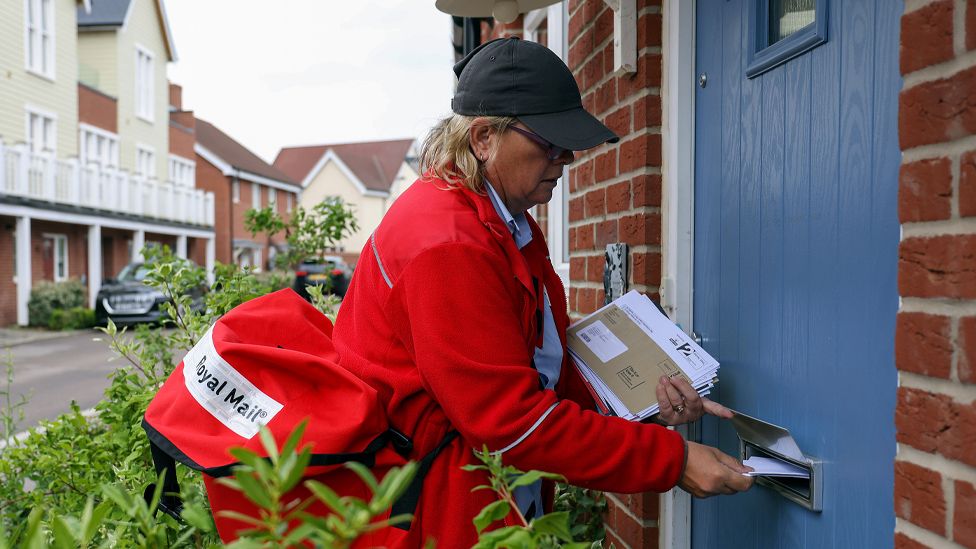
By Lora Jones
Business reporter, BBC News
Royal Mail wants to keep its six-day-a-week service for first class letters under new proposals for reform.
But the company said it would cut deliveries for second class letters to every other weekday.
It comes after regulator Ofcom suggested Royal Mail could reduce the number of delivery days from six to as few as three per week for all letters.
The firm has struggled as letter volumes have plummeted in recent years leading to heavy financial losses.
Its performance has also been poor, with households and businesses complaining about delays on deliveries of important letters detailing medical appointments or legal documents.
The company’s boss said the suggested reforms would give it a “fighting chance” to change and keep its “universal service”.
Royal Mail, which was split from the Post Office and privatised a decade ago, is legally obliged to deliver a one-price-goes-anywhere postal service,which means it has to deliver letters six days per week, Monday to Saturday, and parcels Monday to Friday.
While it is planning to cut second-class letter deliveries under its reforms, the company has said parcels – which have become more popular in recent years and are more profitable – would still be delivered seven days a week.
Its proposals, to be considered by Ofcom, include:
- Maintaining the one-price-goes-anywhere service for the whole of the UK
- First class letters delivered daily, six days a week (Monday to Saturday)
- Changing deliveries of all non-first class letters to every other weekday
- Parcels delivered up to seven days a week as currently
- The delivery speed of mail for big shippers used for things like bills arriving within three weekdays instead of two
If the plans are approved by the regulator, it would mean daily delivery routes are cut by between 7,000 to 9,000 within two years, and would likely lead to job cuts.
Royal Mail said there would be “fewer than 1,000” voluntary redundancies and it expects no compulsory redundancies as part of the proposed overhaul which will target savings of £300m a year.
Martin Seidenberg, chief executive of International Distributions Services, Royal Mail’s parent company, said that the current universal service was now “unsustainable”.
With letter volumes dropping from a peak of 20 billion a year in 2004 to seven billion a year, Mr Seidenberg suggested: “Reform gives us a fighting chance and will help us on the path to sustainability.”
‘We have to change universal service’
“If we want to save the universal service, we have to change the universal service,” Mr Seidenberg added.
He also voiced “serious concerns” that the situation was not being treated with enough urgency by the regulator. The company has been struggling financially, making a loss of £419m last year.
Royal Mail wants the watchdog to introduce changes by April 2025 at the latest. It said there would be no need for the government and parliament to change the current legislation if its proposals were accepted, due to it wanting to maintain the six-day-a-week service.
An Ofcom spokesperson said it had “laid out some potential options” so that there could be a “national discussion” over the future of the universal postal service. “We’ll carefully consider all the feedback received, and provide an update in the summer,” they added.
Under the regulator’s current rules, each year Royal Mail is required to deliver 93% of first class post within one working day and 98.5% of second class within three working days, but in 2022-23 the company only delivered 73.7% of first class and 90.7% of second class mail on time.
In response to Royal Mail’s submission to the regulator on Wednesday, a spokesperson for the Department for Business said that any changes to its operations would “need to take into account the impacts on business and vulnerable consumers who rely on this vital service”.
They said that it currently had no plans to change the universal service obligation, but that it would wait for Ofcom’s recommendations. The government has strongly opposed the reduction of a six-day service.
The Liberal Democrats’ business spokeswoman Sarah Olney said Royal Mail’s proposal to reduce second-class deliveries was a “slap in the face for families being asked to pay more for less”.
Meanwhile, the boss of the UK’s Greeting Cards Association, Amanda Fergusson, said reforms put forward by Royal Mail would “ignore” the needs of the businesses it represents.
“They expect a postal service that’s national, reliable, and affordable and they’re not getting it,” she said.
Royal Mail also wants the regulator to introduce new reliability targets for first class and second class services to give customers more confidence.
First-class stamps rise to £1.35
It comes as the price of stamps increased on Tuesday, rising by up to 13% for a second class standard letter which now costs 85p to send. The cost of a first class standard letter also went up 8% to £1.35.
On Wednesday, the company responded to complaints by consumers who have been hit with £5 charges to collect post because the stamps affixed were flagged as counterfeit.
The issue has emerged since the postal service switched to a new barcoded system last July.
Royal Mail said that it has been able to significantly reduce stamp fraud, with a unique barcode for each stamp meaning they can identify when a stamp has been used before.
A spokesperson said it wants consumers to use stamps “with confidence” and strongly recommended they only buy them from post offices or other High Street retailers.








